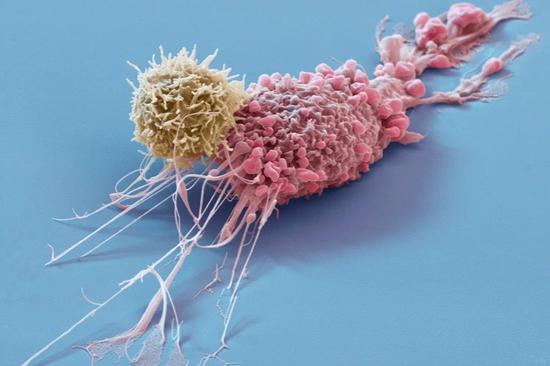Cell therapy for autoimmune diseases deemed a world-first
A new type of therapy devised by Chinese scientists using healthy donor cells, which have shown significant promise in treating severe autoimmune disorders, recently made headlines on the website of the scientific journal Nature.
Three patients at Shanghai Changzheng Hospital who are being treated for severe, treatment-resistant autoimmune diseases underwent the therapy and achieved long-term remission, representing the first reported successful use of such an approach for autoimmune diseases in the world.
The Nature article introduced chimeric antigen receptor T-cell therapy, which involves genetically modifying a patient's T-cells — white blood cells that are an important part of the immune system — to attack cancer cells. Titled "World-first therapy using donor cells sends autoimmune diseases into remission", it was published on the Nature website on Oct 5, Beijing time.
On July 16, a paper about the research led by Shanghai Changzheng Hospital, in conjunction with East China Normal University and the Second Hospital Affiliated with Zhejiang University School of Medicine, was published on the website of the journal Cell.
CAR-T therapy has helped revolutionize cancer treatment in recent years.
The new study led by Xu Huji from Changzheng Hospital explored the therapy's potential for treating autoimmune diseases, which occur when the immune system attacks healthy tissues. CAR-T therapy typically relies on a patient's own T-cells. But in autoimmune diseases, a patient's T-cells may be dysfunctional. The new approach uses healthy donor cells, offering a potentially more effective solution, said Xu, director of rheumatology and immunology at the hospital.
"The treatment's success in three people raises hopes for mass production of cutting-edge CAR-T therapies," the Nature article says. "If it proves successful, it'd allow pharmaceutical companies to scale up manufacturing, potentially slashing costs and production times. Instead of making one treatment for one person, therapies for more than a hundred people could be made from one donor's cells."
More than 80 autoimmune diseases are linked to malfunctioning immune cells. Most of these diseases have limited treatment options, and there is no cure for them.
"So far, 24 other patients with autoimmune disorders have received the donor-derived treatment and a slightly modified product in our research, and the results have been largely positive," Xu said.
The three patients involved in the clinical trial reported in the article are one woman and two men. One who has immune-mediated necrotizing myositis regained significant mobility after treatment. The two others, who have systemic sclerosis, a condition characterized by hardened skin, experienced skin softening and improved organ function.
Xu explained that in the development of some autoimmune disorders, the abnormal development and dysfunction of B-cells, which are white blood cells involved in the body's adaptive immune system, is one of the main causes of the disease.
CAR-T therapy has exhibited great potential in the treatment of malignancies related to B-cells, Xu said.

